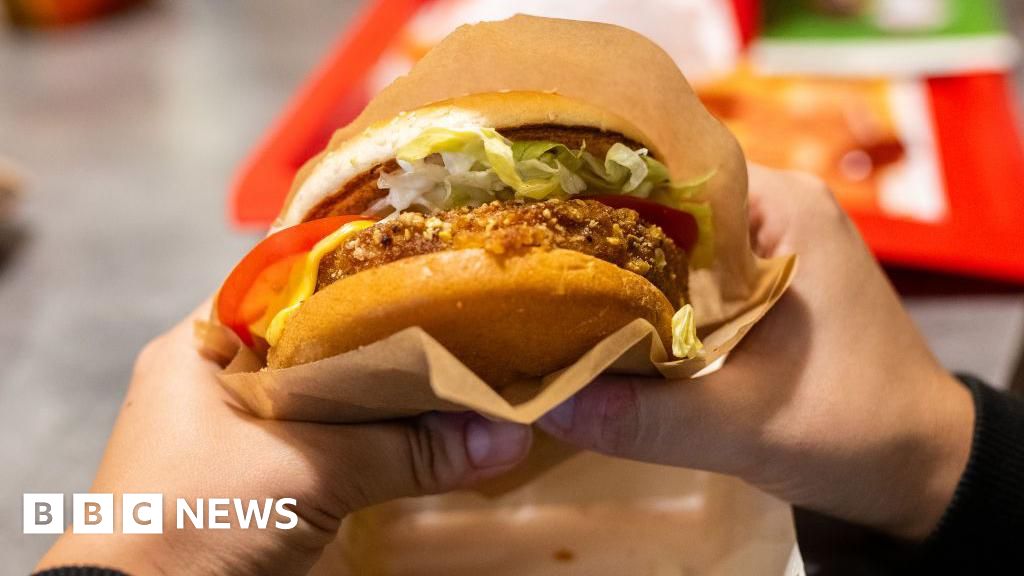McDonald’s to ‘rethink’ prices after first sales fall since 2020

McDonald’s is reconsidering its pricing strategy, after customers cutting back their spending took a bite out of the fast food giant’s sales.
Outlets open for at least a year saw sales fall 1% over the April-June period compared with a year earlier – the first such decline since the pandemic.
The drop came despite the hamburger chain offering money off deals to try to win back cost-conscious customers and those who have boycotted the chain over the Israel-Gaza war.
Boss Chris Kempczinski said the poor results had forced the company into a “comprehensive rethink” of pricing.
He told investors that the firm would lean on discounts to try to stop the sales decline
Executives pointed to recent promotions, such as a $5 happy meal in the US and a campaign in the UK in which diners can select three items for £3.
Those are expected to be extended in the coming months and the firm said it was working with franchisees on other “value” efforts.
Shares in the company rose more than 3% after the update, as Mr Kempczinski said McDonald’s had the scale to make the strategy work.
“We know how to do this. We wrote the playbook on value and we are working with our franchisees to make the necessary adjustments,” he said.
McDonald’s has been facing a backlash from customers after raising prices significantly during the pandemic.
Last month, the head of its US operations formally responded to the complaints with an open letter to customers, saying social media was painting an inaccurate picture.
He said the average price of a Big Mac in the US, which is now $5.29 (£4.11), was up 21% since 2019 – roughly in line with the pace of inflation – and many items had risen by less.
But on the call with investors, Mr Kempczinski conceded the company had work to do to reclaim its reputation for value.
Price increases, made in response to inflation, had “led consumers to reconsider their buying habits”, Mr Kempczinski admitted.
Though some markets have been able to adjust, in others, “a more comprehensive rethink has been required”, he said.
McDonald’s has increased prices on key items faster than its peers, said Bank of America analyst Sara Senatore.
“Consumers are savvy, aware of that,” she said. “The $5 meal that they have launched may be starting to change perceptions, but we are not seeing a trend change yet in terms of transactions and that’s what they’re going to need to see.”
McDonald’s is the latest corporate giant to warn of slower consumer spending, including in major economies such as China.
The company said overall revenue, which includes sales at newly opened stores, was flat year-on-year. Profits slipped 12%.
McDonald’s said lower income customers were particularly hurting and the loss of those buyers was not being made up by wealthier households trading down.
Demand at its restaurants fell in the US, the company said, while weakness in France and price wars in China also weighed on sales.
France is among the countries where the brand has been caught up in boycott calls sparked by Israel’s war in Gaza. Other US companies, including Starbucks, have also been affected.
“Consumers are being more discerning about where, when and what they eat, and I would say we don’t expect significant changes in that environment for the next few quarters,” a McDonald’s executive said on the call.
Related
Why investing in women is a vital next step for…
Get Nadine White's Race Report newsletter for a fresh perspective on the week's newsGet our free newsletter from The Independent's Race CorrespondentGet our fre
Business secretary signals major shift on electric car policy to…
In a determined effort to retain Nissan’s manufacturing presence in Britain, Business Secretary Jonathan Reynolds has vowed to implement “substantial c
Joint Statement: Business Secretary and Fujitsu Services Ltd
Business and Trade Secretary Jonathan Reynolds today (Friday 7 March) met chiefs for Fujitsu in Tokyo to begin talks over the cost of redress for victims of th
UK foreign secretary backs multilateral defence funding for Europe
UK foreign secretary David Lammy has said that a new multilateral fund will be needed to secure Europe’s defence as he confirmed that Britain is “open to”













